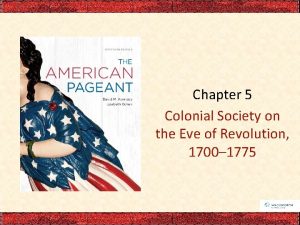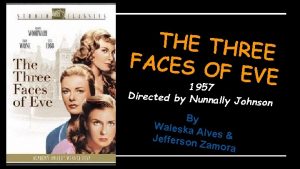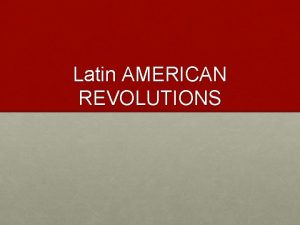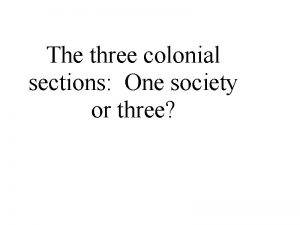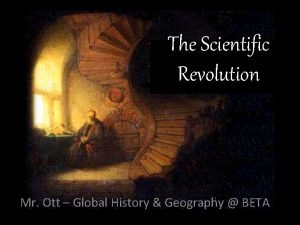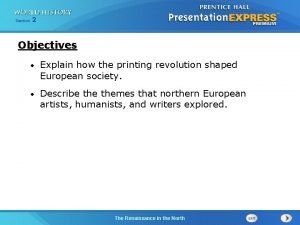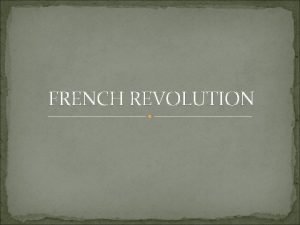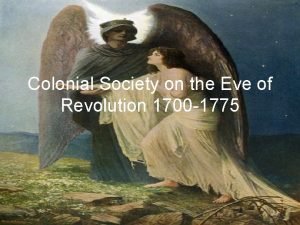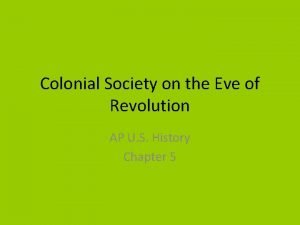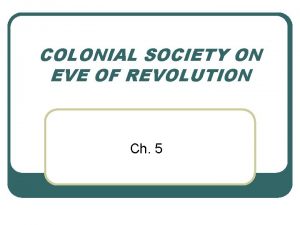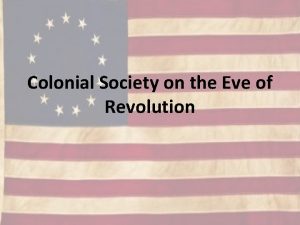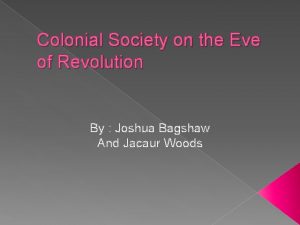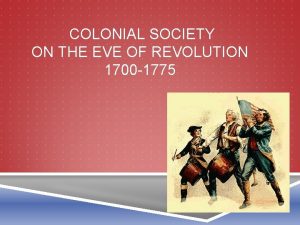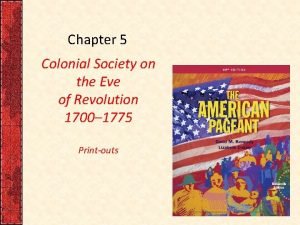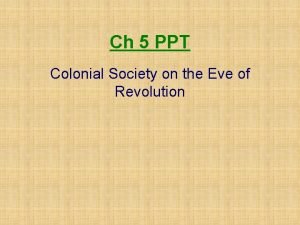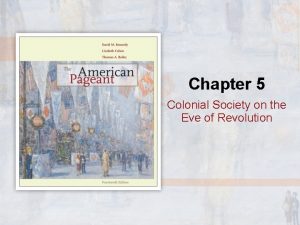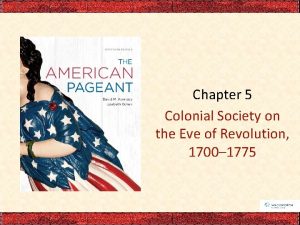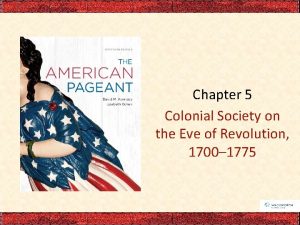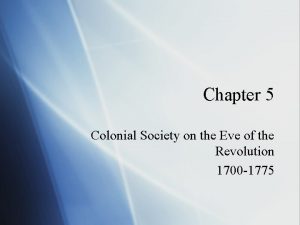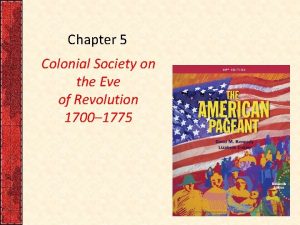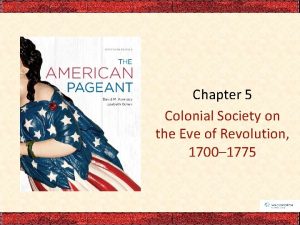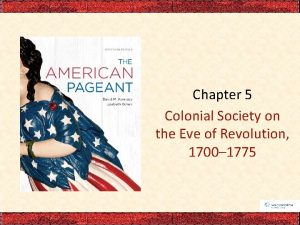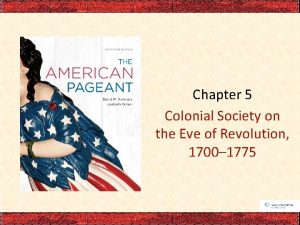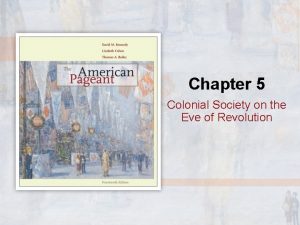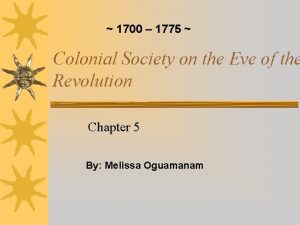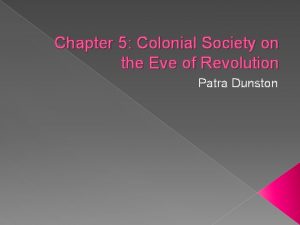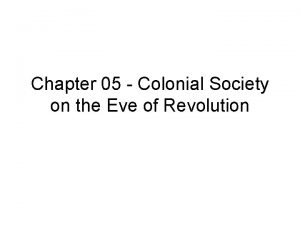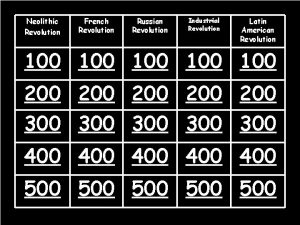COLONIAL SOCIETY ON THE EVE OF REVOLUTION AP



























- Slides: 27

COLONIAL SOCIETY ON THE EVE OF REVOLUTION

AP FOCUS • British crown policies subordinated American capital to British capital • 18 th Century America is a melting pot of races, cultures, religions and ethnicities. Western and central Europeans dominate the early American colonies. • One half of the American people, by the late 18 th Century, are English or of English descent. • The triangular trade is essential to trade and commerce in the colonies.

AP FOCUS • Challenges to the institutions and ideologies that dominated Europe and early colonial American emerge. The First Great Awakening leads to the development of American centers of higher learning. Political and judicial developments and the advent of the American press play a pivotal role in establishing a uniquely American character. • Despite claims that the American colonies were more democratic and less socially stratified than Europe, a social class structure did exist. Slavery, indentured servants, and arriving lower -class immigrants contribute to this

SOME DEMOGRAPHICS • By 1775, 2. 5 million people inhabit the 13 colonies • Those born in England had fallen from 20: 1 in 1700 to 3: 1 by 1775 • The vast majority lived east of the Appalachian mountains… 90% of the population lived in rural areas • Philadelphia was the largest city with 34, 000 people

MINGLING OF THE RACES • Although most were English, there were other ethnicities present • Germans made up 6% of the population while Scots-Irish made up 7%. • These people started moving inland fighting the Indians over land

THE PAXTON BOYS • The Paxton Boys were frontiersmen of Irish origin who formed a vigilante group against the Indians in Pennsylvania (Jan. 1764) • They killed 20 Conestoga Indians who were living on land granted them by William Penn • After the massacre, the Paxton Boys marched to Philadelphia to present their grievances. They dispersed when they were told the issues with the Indians would be dealt with

THE STRUCTURE OF COLONIAL SOCIETY • Class differences existed in the colonies…there wealthy plantation owners, clergymen, government officials, and powerful merchants • Wars helped bring riches to merchants…how? • Large numbers of poor in the colonies…some built poorhouses (almshouses)

• In the South, wealth was concentrated in the hands of the plantation and slave owners • Next were the yeomen farmers, landless whites, beggars and slaves who had no rights

CLERICS, PHYSICIANS AND JURISTS • The most honored profession in the American colonies was that of clergyman • Most physicians, on the other hand, were poorly trained…no medical school in America until 1765 • Treatments usually involved bloodletting and the use of leeches and home remedies like powdered toad • This was the age of the working man…lawyers were usually seen as drunks and noisy windbags

WORKDAY AMERICA • Agriculture the leading industry in the colonies…involved about 90% of the population • Tobacco king…wheat becoming popular as it grew well on old tobacco land • Fishing and whaling big in New England…both of these helped sustain the shipbuilding industry in NE • Triangular trade still important to the colonies, however, England was no longer an important part of this…need to know why

• Manufacturing beginning in America…good workers very valuable • Lumbering the top manufacturing industry…the “good” trees in the colonies were usually earmarked for British ships…this angered the colonists • American colonies looking to trade with other nations • England passed the Molasses Act in 1733 to undercut the profits the colonies made in the triangle trade…led to widespread smuggling

“MOLASSES ACT” (1733) • British act that imposed a tax on each gallon of molasses that was imported from non-British colonies • It was passed at to make British products from cheaper than those from the French West Indies • The tax was mostly ignored and created a “black market” for smuggled molasses. • The first attempt by the British to tax the colonists

REGULATOR MOVEMENT (WAR OF REGULATION) 1765 -1771 • There was a dramatic population increase in North and South Carolina in the 1760’s • More merchants and lawyers were moving into the Carolinas…this upset the power structure in which the plantation owners were at the top • Due to droughts, the agricultural economy fell into a depression. With the loss of income, many planters fell into debt to the merchants, who relied on lawyers to settle any disputes

• Many poor farmers lost their homes and property…they resented the newcomers • The Carolina officials were seen a greedy and corrupt by the farmers. Corruption reigned…the colonial governor supported the officials for fear of losing their support • The War of Regulation was an attempt by the working farmers to overthrow the system that benefitted the wealthy planters…most people supported the Regulators • This is seen as a step toward Revolution, even though it was a struggle against corrupt officials…not the Crown

HORSEPOWER AND SAILPOWER • Travel very difficult in 18 th Century America. Roads did not connect to major cities and were in poor condition…hard to travel on • Taverns sprung up on the roads to serve food, drink, a place to talk and a place to sleep for travelers • Explain how these turned out to be another cradle of democracy

DOMINANT DENOMINTIONS • Two tax-supported churches dominated 17 th Century America- the Anglican and Congregationalists (although by this time, 25% of people did not go to church) • Anglican Church in America less strict than the Puritans. Less “fire and brimstone” and sermons were shorter. Anglican clergymen in America not up to England’s standards. College of William and Mary founded in 1693 to better train ministers.

• Congregationalist Church very powerful in New England taxed all citizens to support itself. Started becoming increasingly vocal against England…the Anglican churches in the South kept their allegiance to the King • Catholics still not popular in America…but most colonists let people worship as they pleased

ARMINIANS • Followers of Arminianism Based on 5 principles • 1. election (and condemnation on the Day of Judgement) conditioned by the rational faith, or non-faith, of man • 2. atonement was only for the man of faith • 3. unaided by the Holy Spirit, no person is able to respond to God’s will • 4. grace is not irresistible • 5. believers are able to resist sin but are not beyond the possibility of falling from grace

THE GREAT AWAKENING • In the middle 1700’s, religion is becoming less important than it had been a century before • Churchgoers said sermons too long…ministers believed people had gone “soft” • Liberal ideas becoming popular that were challenging the notion of predestination • Jacob Arminius preached that “free will” determined a person’s fate, not divine decree • Churches agreed with this by no longer requiring membership in the church for spiritual conversion

JONATHAN EDWARDS V. GEORGE WHITFIELD • George Whitfield preached human helplessness and the omnipotence of God…leader of the “New Light” ministers • Began missionary work to convert Indians and slaves • Led to the growth of universities with new schools of thought (Princeton, Brown, Dartmouth) • Jonathan Edwards preached that the belief of salvation through good works was folly…believed that people needed to be completely dependent on God’s grace for salvation

SCHOOLS AND COLLEGES • Early colonial beliefs were that education was for leadership, not citizenship, and only for men • School’s main instruction was to focus on the Bible and prepare men for the ministry • As time changed, school shifted from teaching “dead” languages to “live” languages. • The University of Pennsylvania was founded by Benjamin Franklin as a school to educate the children of the poor and working class to lead in government, business and public service

COLONIAL PRESS Printing and reading were not common in the colonies…most reading material was in pamphlet or leaflet form News often lagged weeks behind. With the introduction of newspapers, colonists discovered ways to air their grievances and voice opposition to British control Pointed the way to open discussion in this diverse society

COLONIAL POLITICS • Of the colonies, 8 had royal governors appointed by the King • 3 proprietary colonies (MD, DE, PA) chose their governors while CT and RI elected their governors under self-governing charters • Every colony had a two-house legislature…the Upper House was chosen by royal officials or the colony’s proprietor) the Lower House was elected by the people of the colony • Direct representation and self-taxation very important to the colonists

• Colonists could withhold a governor’s salary to make him fall in line if he went against the people • County government the norm in the South while New England used the town meeting format…both of these were seen in the middle colonies • Town meetings helped democracy flourish- they had open discussions and open voting • The upper classes did not want lower classes to vote, but with so much land available, this did not happen

COLONIAL FOLKWAYS • Life was hard but tolerable. There was plenty of food available, but very few comforts • No heat…no running water…no indoor plumbing • Hogs were used to eat garbage • Militia meetings were mostly for socializing • Work and play mixed in quilting bees, barn and house raisings • Southerners played cards, hunted fox, staged plays and raced horses • Dancing popular in the non-Puritan South

• Holidays were celebrated everywhere • Christmas was NOT popular in the North as it was seen as a Catholic celebration • Lotteries were extremely popular…money went to support and build schools and colleges

SUMMARY • By the mid 1700’s, the colonies began to take on similarities to each other • All were basically English in language and customs and Protestant in religion…however, there were new ethnic and religious cultures arriving in America • The colonies presented an opportunity for people to move up the social and economic ladder • They all possessed some measure of self-government, but still not total democracy • Each colony was bound together by common origins, common ways of life, and common beliefs in toleration, economic development and self-rule
 Colonial society on the eve of revolution
Colonial society on the eve of revolution Colonial society on the eve of revolution
Colonial society on the eve of revolution Chapter 5 colonial society on the eve of revolution
Chapter 5 colonial society on the eve of revolution Eve white, eve black y jane
Eve white, eve black y jane The divisions in spanish colonial society 1789
The divisions in spanish colonial society 1789 The three colonial sections-one society or three
The three colonial sections-one society or three Green revolution vs third agricultural revolution
Green revolution vs third agricultural revolution Russian revolution vs french revolution
Russian revolution vs french revolution How could the french revolution have been avoided
How could the french revolution have been avoided 1799 france
1799 france Scientific revolution effects on society
Scientific revolution effects on society Explain how the printing revolution shaped european society
Explain how the printing revolution shaped european society How was the society divided before the french revolution
How was the society divided before the french revolution Gertler econ
Gertler econ Diễn thế sinh thái là
Diễn thế sinh thái là Tư thế ngồi viết
Tư thế ngồi viết V. c c
V. c c Thơ thất ngôn tứ tuyệt đường luật
Thơ thất ngôn tứ tuyệt đường luật Làm thế nào để 102-1=99
Làm thế nào để 102-1=99 Hát lên người ơi alleluia
Hát lên người ơi alleluia Hổ sinh sản vào mùa nào
Hổ sinh sản vào mùa nào đại từ thay thế
đại từ thay thế Vẽ hình chiếu vuông góc của vật thể sau
Vẽ hình chiếu vuông góc của vật thể sau Cong thức tính động năng
Cong thức tính động năng Tỉ lệ cơ thể trẻ em
Tỉ lệ cơ thể trẻ em Thế nào là mạng điện lắp đặt kiểu nổi
Thế nào là mạng điện lắp đặt kiểu nổi Lời thề hippocrates
Lời thề hippocrates Vẽ hình chiếu đứng bằng cạnh của vật thể
Vẽ hình chiếu đứng bằng cạnh của vật thể


